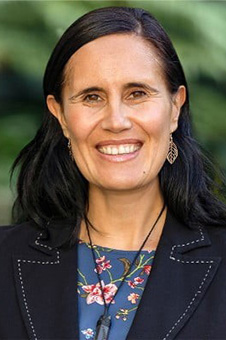Aotearoa will become a “hot house” by 2050 if it does not introduce additional climate policies, Tourism Industry Transformation Plan Environment Co-Chair Laurissa Cooney announced at the University of Otago’s Tourism Policy School today.
Launching The Aotearoa Circle’s Tourism Climate Change Scenarios Report on the second day of the Policy School, Ms Cooney shared the three possible futures for the tourism sector based on the country’s climate action.

Laurissa Cooney.
“The New Zealand tourism industry has a significant reliance on the natural environment,” Ms Cooney says.
“As we take flight again [following the COVID‑19 pandemic], the country can follow regenerative pathways to safeguard our clean and green reputation, while ensuring we adapt to the impacts of climate change.”
The first scenario, called Hiahia – Net Zero 2050, limits the global warming to +1.5 degC by the end of the century through stringent climate policies and system change, societal shift in mindset, and innovation and investment.
“It is ambitious, but can be done with bold action that includes implementing robust policy and pro-active systems change to drive down our emissions.
“If we can do that, then international travel can be transformed and our tourism sector can become a world leader in a regenerative approach.”
The second scenario, Pokanoa – Disorderly 2050, shows a “disorderly” transition with little policy action until after 2030 when strong, rapid action is needed to limit warming to 2 degC.
Physical and transition risks are higher, and tourism operating costs increase, Ms Cooney says.
The third scenario is Wharewera – Hothouse 2050.
The physical impacts of climate change would be severe, with irreversible changes like glacial melt and sea level rise.
“There would be frequent damage and disruptions to transport, infrastructure, and food supply.
“Severe weather events like the recent North Island floods and cyclones will be evermore frequent. No-one wants to be in the hothouse scenario.”
All three scenarios demonstrate that everyone must collectively do everything they can to keep below +1.5 degC of warming, Ms Cooney says.
“The scale of the challenges we face in the future will be determined by how quickly and proactively we respond now.
“We need to commit to rapidly following regenerative pathways or we will see a catastrophic decline in our natural environment.”
The fifth annual University of Otago Tourism Policy School is a two-day event bringing together industry leaders, policy makers and prominent researchers to discuss key challenges in the New Zealand tourism industry.
This year’s theme is “Tourism Policy: Are we fit for purpose?”.
Ms Cooney was the Co-Chair of The Aotearoa Circle’s Tourism Sector Climate Change Scenarios report released today.
For more information, contact:
Laurissa Cooney
Tourism ITP Co-Chair
Email laurissa@laurissacooney.com
Jessica Wilson
Adviser Media Engagement
University of Otago
Mob +64 21 279 5016
Email jessica.wilson@otago.ac.nz







